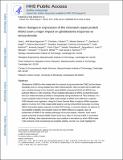| dc.contributor.author | Sangaraju, D. | |
| dc.contributor.author | Tretyakova, N. | |
| dc.contributor.author | McFaline, Jose Luis | |
| dc.contributor.author | Stanciu, Monica | |
| dc.contributor.author | Nagel, Zachary D. | |
| dc.contributor.author | Mazzucato, Patrizia | |
| dc.contributor.author | Cerniauskas, Edvinas | |
| dc.contributor.author | Barford, Kelly | |
| dc.contributor.author | Vargas, Amanda | |
| dc.contributor.author | Chen, Yimin | |
| dc.contributor.author | Lees, Jacqueline | |
| dc.contributor.author | Hemann, Michael | |
| dc.contributor.author | Samson, Leona D | |
| dc.contributor.author | Braun, Christian Joerg | |
| dc.contributor.author | White, Forest M. | |
| dc.date.accessioned | 2017-01-11T20:26:34Z | |
| dc.date.available | 2017-01-11T20:26:34Z | |
| dc.date.issued | 2015-08 | |
| dc.date.submitted | 2015-04 | |
| dc.identifier.issn | 0008-5472 | |
| dc.identifier.issn | 1538-7445 | |
| dc.identifier.uri | http://hdl.handle.net/1721.1/106346 | |
| dc.description.abstract | Glioblastoma (GBM) is often treated with the cytotoxic drug temozolomide, but the disease inevitably recurs in a drug-resistant form after initial treatment. Here, we report that in GBM cells, even a modest decrease in the mismatch repair (MMR) components MSH2 and MSH6 have profound effects on temozolomide sensitivity. RNAi-mediated attenuation of MSH2 and MSH6 showed that such modest decreases provided an unexpectedly strong mechanism of temozolomide resistance. In a mouse xenograft model of human GBM, small changes in MSH2 were sufficient to suppress temozolomide-induced tumor regression. Using The Cancer Genome Atlas to analyze mRNA expression patterns in tumors from temozolomide-treated GBM patients, we found that MSH2 transcripts in primary GBM could predict patient responses to initial temozolomide therapy. In recurrent disease, the absence of microsatellite instability (the standard marker for MMR deficiency) suggests a lack of involvement of MMR in the resistant phenotype of recurrent disease. However, more recent studies reveal that decreased MMR protein levels occur often in recurrent GBM. In accordance with our findings, these reported decreases may constitute a mechanism by which GBM evades temozolomide sensitivity while maintaining microsatellite stability. Overall, our results highlight the powerful effects of MSH2 attenuation as a potent mediator of temozolomide resistance and argue that MMR activity offers a predictive marker for initial therapeutic response to temozolomide treatment. | en_US |
| dc.description.sponsorship | National Cancer Institute (U.S.). Integrative Cancer Biology Program (Grant U54-CA112967) | en_US |
| dc.description.sponsorship | National Institutes of Health (U.S.) (Grants R01-ES022872, P30-CA014051, P30-ES002109, T32GM007287, T32-GM081081 and DP1-ES022576) | en_US |
| dc.description.sponsorship | German Cancer Aid (Mildred-Scheel Fellowship) | en_US |
| dc.description.sponsorship | National Cancer Institute (U.S.) (Ruth L. Kirschstein National Research Service Award 5F31CA165735) | en_US |
| dc.language.iso | en_US | |
| dc.publisher | American Association for Cancer Research | en_US |
| dc.relation.isversionof | http://dx.doi.org/10.1158/0008-5472.can-14-3616 | en_US |
| dc.rights | Creative Commons Attribution-Noncommercial-Share Alike | en_US |
| dc.rights.uri | http://creativecommons.org/licenses/by-nc-sa/4.0/ | en_US |
| dc.source | PMC | en_US |
| dc.title | Minor Changes in Expression of the Mismatch Repair Protein MSH2 Exert a Major Impact on Glioblastoma Response to Temozolomide | en_US |
| dc.type | Article | en_US |
| dc.identifier.citation | McFaline-Figueroa, J. L. et al. “Minor Changes in Expression of the Mismatch Repair Protein MSH2 Exert a Major Impact on Glioblastoma Response to Temozolomide.” Cancer Research 75.15 (2015): 3127–3138. | en_US |
| dc.contributor.department | Massachusetts Institute of Technology. Center for Environmental Health Sciences | en_US |
| dc.contributor.department | Massachusetts Institute of Technology. Department of Biological Engineering | en_US |
| dc.contributor.department | Massachusetts Institute of Technology. Department of Biology | en_US |
| dc.contributor.department | Koch Institute for Integrative Cancer Research at MIT | en_US |
| dc.contributor.mitauthor | McFaline, Jose Luis | |
| dc.contributor.mitauthor | Braun, Christian Jorg | |
| dc.contributor.mitauthor | Stanciu, Monica | |
| dc.contributor.mitauthor | Nagel, Zachary D. | |
| dc.contributor.mitauthor | Mazzucato, Patrizia | |
| dc.contributor.mitauthor | Cerniauskas, Edvinas | |
| dc.contributor.mitauthor | Barford, Kelly | |
| dc.contributor.mitauthor | Vargas, Amanda | |
| dc.contributor.mitauthor | Chen, Yimin | |
| dc.contributor.mitauthor | Lees, Jacqueline | |
| dc.contributor.mitauthor | Hemann, Michael | |
| dc.contributor.mitauthor | White, Forest M | |
| dc.contributor.mitauthor | Samson, Leona D | |
| dc.relation.journal | Cancer Research | en_US |
| dc.eprint.version | Author's final manuscript | en_US |
| dc.type.uri | http://purl.org/eprint/type/JournalArticle | en_US |
| eprint.status | http://purl.org/eprint/status/PeerReviewed | en_US |
| dspace.orderedauthors | McFaline-Figueroa, J. L.; Braun, C. J.; Stanciu, M.; Nagel, Z. D.; Mazzucato, P.; Sangaraju, D.; Cerniauskas, E.; Barford, K.; Vargas, A.; Chen, Y.; Tretyakova, N.; Lees, J. A.; Hemann, M. T.; White, F. M.; Samson, L. D. | en_US |
| dspace.embargo.terms | N | en_US |
| dc.identifier.orcid | https://orcid.org/0000-0002-5229-8748 | |
| dc.identifier.orcid | https://orcid.org/0000-0002-7221-6041 | |
| dc.identifier.orcid | https://orcid.org/0000-0001-9451-2194 | |
| dc.identifier.orcid | https://orcid.org/0000-0002-1545-1651 | |
| dc.identifier.orcid | https://orcid.org/0000-0002-7112-1454 | |
| mit.license | OPEN_ACCESS_POLICY | en_US |
